Tabletop •
When last we left our intrepid rebels, they had convinced the French to send a few resources their way and used them to take control of New Hampshire. Unfortunately, the British had troops to spare and loaded up Pennsylvania with both regulars and Tories and even built a fort in the Keystone State. Not to be outdone, the Native Americans added more warbands to the territories west and north of the Proclamation of 1763 line, and even built a village just outside the colonies. Luckily, both the Native Americans and British were unavailable for Turn 3, so lets see if the French and Patriots can make up some ground.
Due to the nature of the Patriot’s turn, I thought it might be a prudent time to discuss how each faction can actually win Liberty or Death. Unlike other games, each faction has their own goals and their own victory conditions. While the French and Patriots (and British and Native Americans) are teams, they cannot both win. Thus, they have some victory conditions that are the same, but other victory conditions at odds with each other. It’s a rather brilliant design, but can be daunting to determine just what you should be doing to help your team, but help yourself more.
Let’s list each faction’s victory conditions and then I’ll explain them:
- British: Support exceeds Opposition by more than 10, and Cumulative Rebellion Casualties (CRC) is greater than Cumulative British Casualties (CBC).
- Native Americans: Support exceeds Opposition by more than 10, and Villages less 3 is greater than Patriot Forts.
- Patriots: Opposition exceeds Support by more than 10, and Patriot Forts plus 3 is greater than Villages.
- French: Opposition exceeds Support by more than 10, and Cumulative British Casualties (CBC) is greater than Cumulative Rebellion Casualties (CRC). Also, the Treaty of Alliance must have been played.
Easy peasy, right? You’ll notice each faction has a requirement for either Opposition or Support to be 10 greater than the other. Opposition is popular support for the Rebellion, while Support is popular support for the Crown. Thus, a big part of the game is turning the colonists’ support to your cause. This is done via a Twilight Struggle-esqe mechanism in which each colony and city (not the Native American territories which, effectively, have 0 population) can be shifted toward one side or the other in a tug-o-war. Most begin the game as Neutral, not giving Support or Opposition to either side. It can be shifted to either Passive Support or Opposition or Active Support or Opposition. If Passive Support/Opposition, the Population is added to that side’s Support/Opposition counter. If Active Support/Opposition, 2x the population is added to that side’s Support/Opposition counter. As the beginning of our game Support and Opposition are both at 4. The British have Passive Support in Quebec City (pop 1 for total of 1 Support), Passive Support in Boston (pop 1 for total of 1 Support), and Passive Support in New York City (pop 2 for total of 2 Support). The Patriots have Active Opposition in Massachusetts (pop 2 for total of 4 Opposition).
The other victory conditions are pretty straightforward, Patriots and Native Americans are trying to have more forts or villages than the other, while the French and British are concerned about killing more of the other side’s cubes. As for the Treaty of Alliance with the French, all that means is that the French are actively out of the war until they play the Treaty. They cannot play it until French War Preparations reach 15. French War Prep is equal to available French troops, fleets in the West Indies, plus one-half of British casualties. When that reaches 15, the French can actively move troops onto the board and start having some real fun. Before that, they’re limited to sneakily helping the Patriots.
All caught up? Good, let’s head to turn 3.
1775, Turn 3
At the end of the last turn, the British and Native American factions were unavailable, meaning that the only two factions able to act this turn are the Patriots and French. The event card drawn is Hessians, and the turn order at the top of the card indicates that the Patriots get to decide their action first.
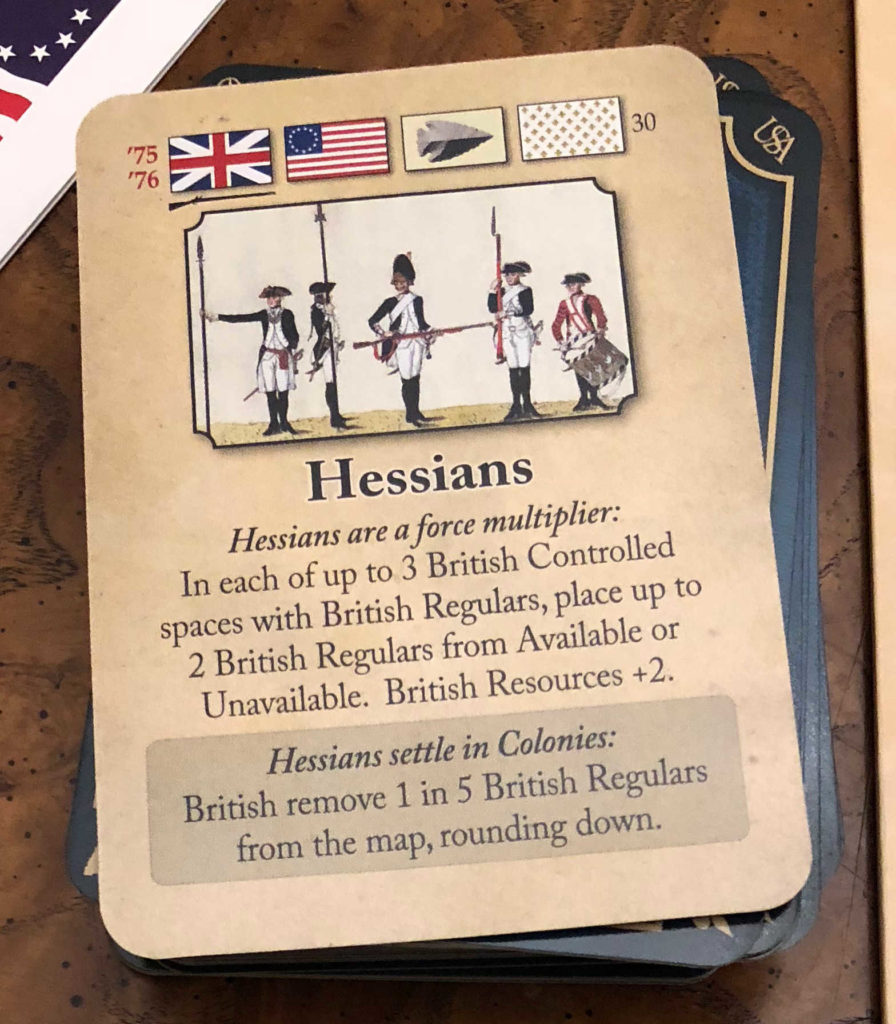
The event for the Patriots would allow them to remove one of every five British Regulars from the map, which would be great if there were more British Regulars on the map. There are currently only 9, meaning this would only get rid of one red cube. We can do better than that.
Instead of taking the event, the Patriots will choose to take a Command and Special Activity. Let’s pick the Command we’re really good at: Rabble Rousing. This is basically us stirring the pot and getting some of those undecided colonists on our side.
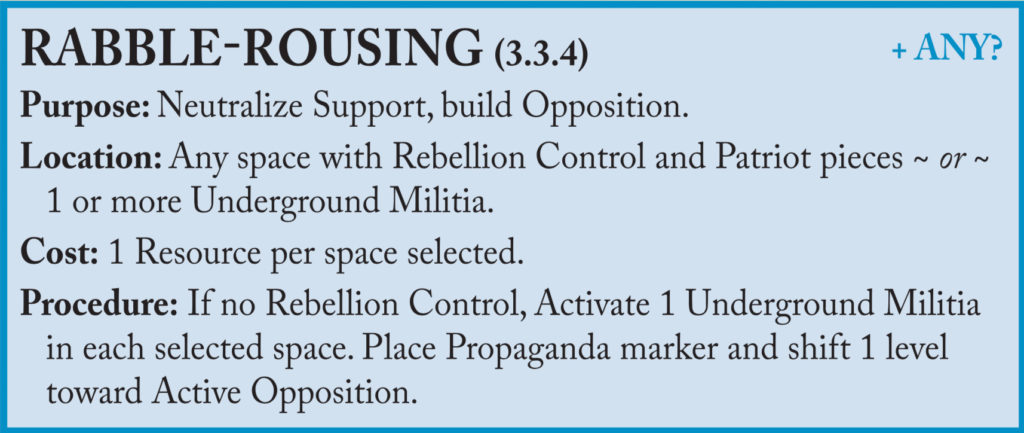
I decided to pick three spaces to rouse, so I spent three resources and picked Virginia, Philadelphia, and New Hampshire. All three locations are under Rebel Control, so I don’t need to activate Militia (meaning they stay hidden from the Brits). Each moves to Passive Opposition, which gives me an additional 4 Total Opposition (1 pop in Philly = 1 Opp, 2 pop in VA = 2 Opp, and 1 pop in NH = 1 Opp), pushing the Total Opposition to eight, while the Brit’s Total Support is at 4. Ha!
I also get to perform a Special Activity (the +ANY in the above Rabble-Rousing image means I can choose any Special Activity after performing this action), so I’ll choose Partisans.
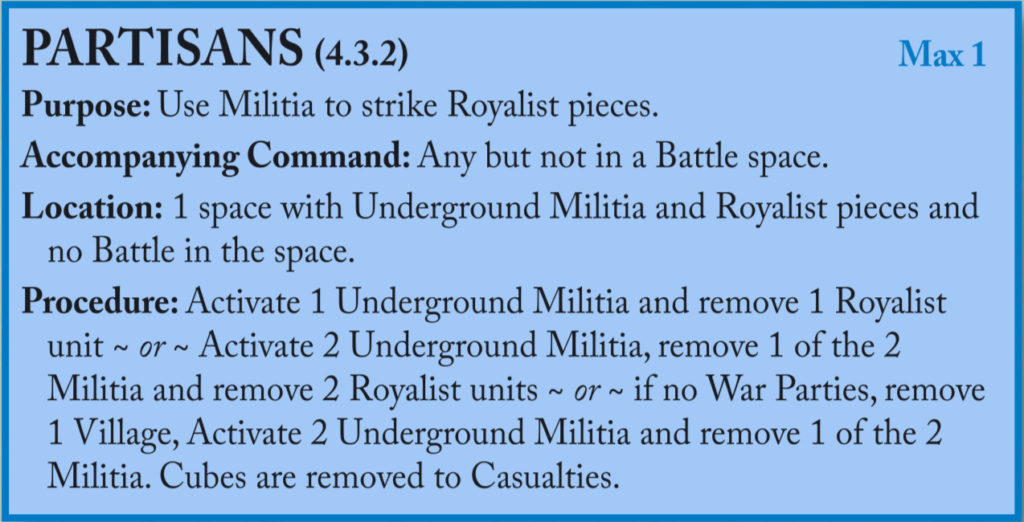
The procedure allows me to Activate one underground Militia and remove a Royalist unit. I could do more, but at this time none of the other options are available to me. Thus, the Patriot Militia in New York takes up arms and moves a British Regulars cube to casualties box, pushing the Combined British Casualties to one.
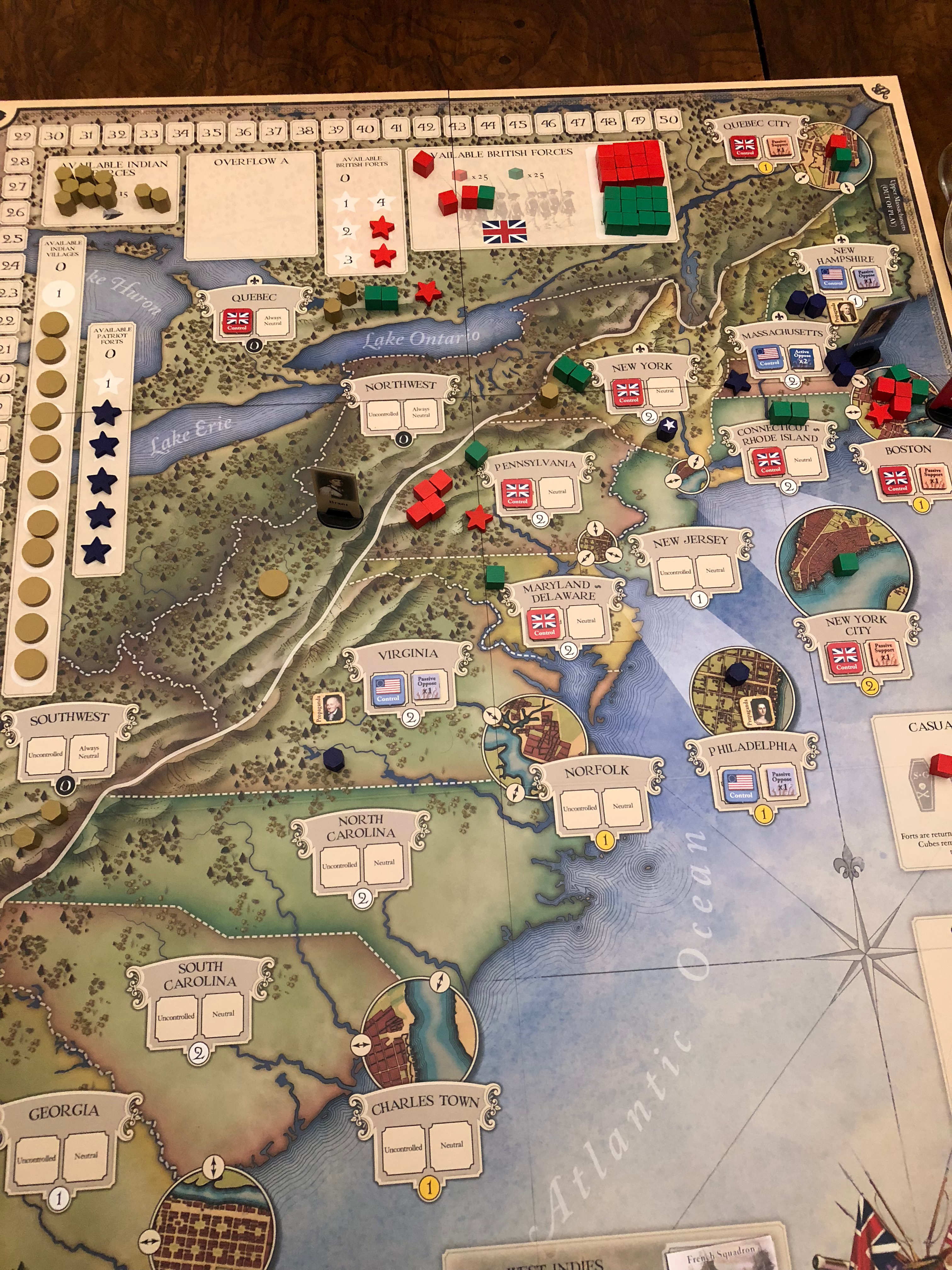
The French are still a bit limited in what they can do. The British Casualty adds another to the French War Prep, but they’re still a long way from the needed 15. Following the AI flowchart, we see that we’re at French Agent Mobilization.
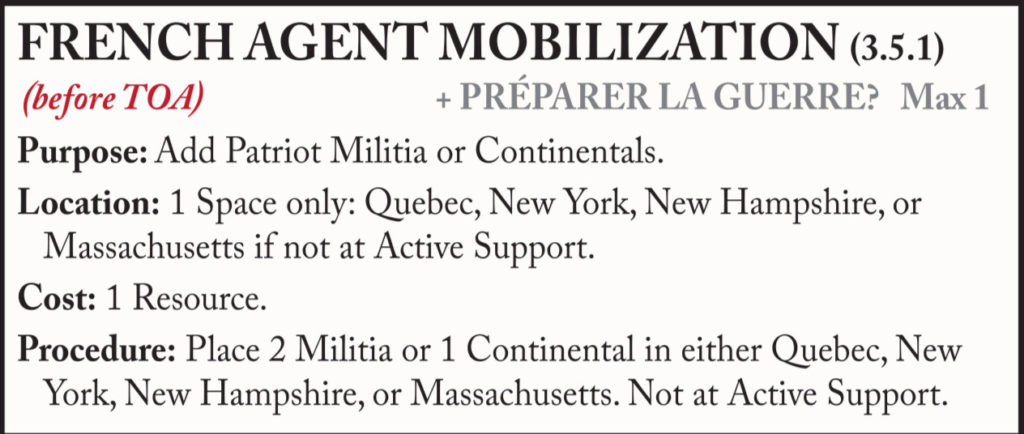
The flowchart indicates which space they will choose to play the 2 Militia, and it will be the space with the most Patriot forces, thus both Militia are placed, underground, in Massachusetts. They then get to perform a Special Ability (normally, the second player would be limited to a Limited Command and no Special Activity, but when playing solo they bots always get to perform a full Command and Special Activity. Sucks to be human). In this case, the only Special Activity allowed is Préparer la Guerre, which allows them to make French troops or fleets available. The bot will move fleets first, so one fleet is moved from unavailable to the West Indies, bumping up the French War Preparation by one.
Both the French and Patriots are now unavailable, and the British and Native Americans are moved to the Available box. Next time we’ll take a look at how they handle the next turn/event, Tryon Plot.
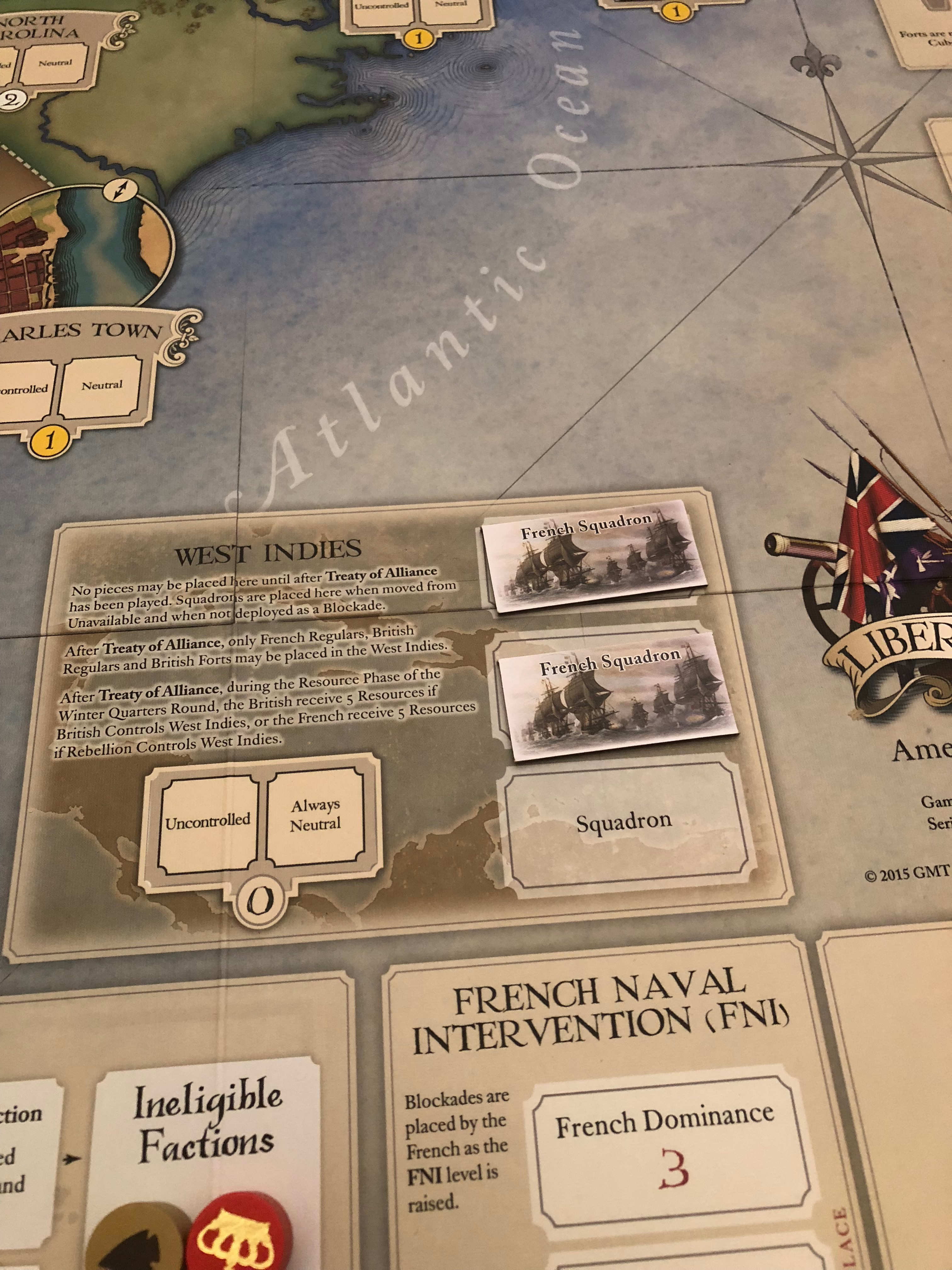
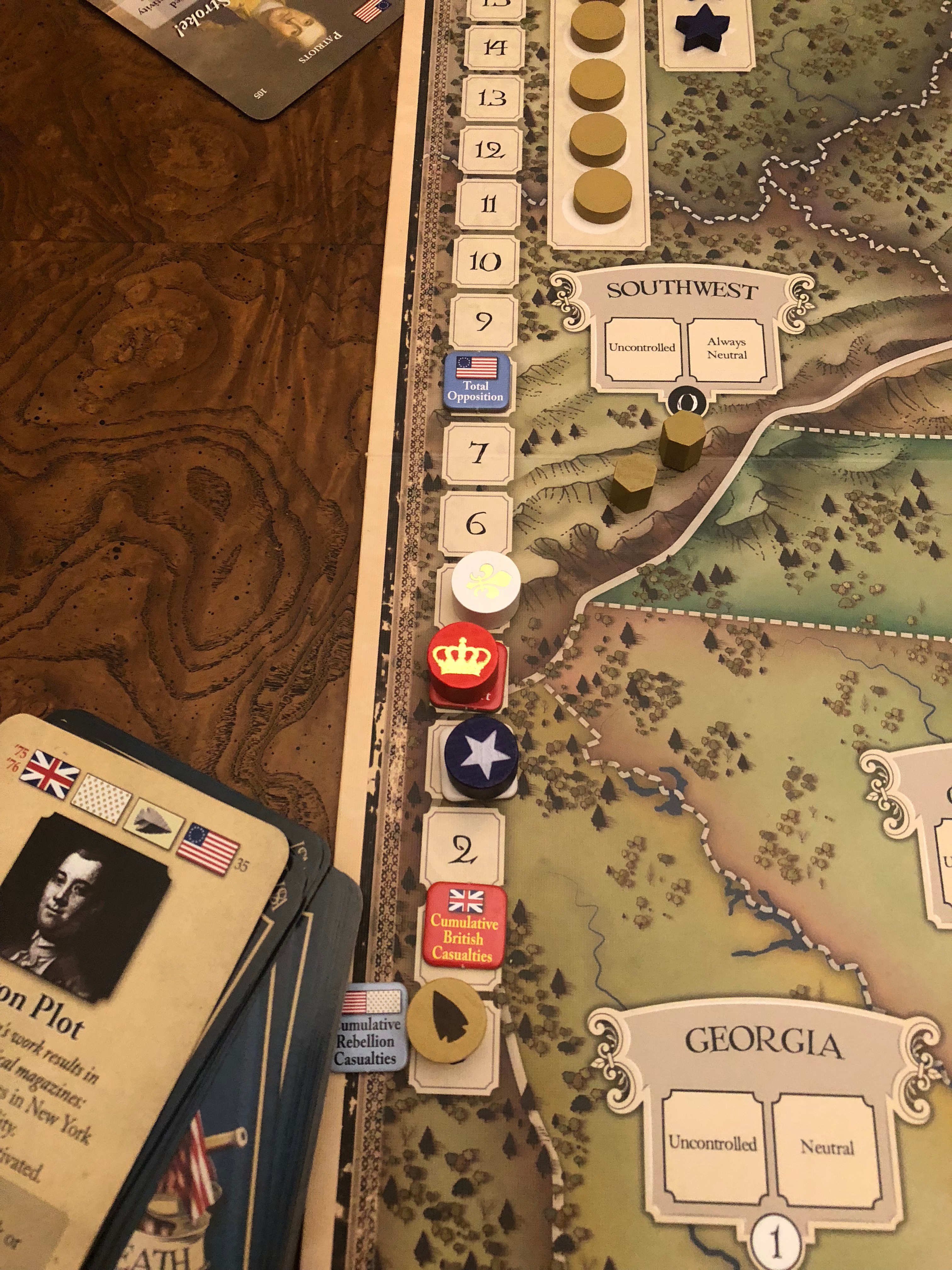
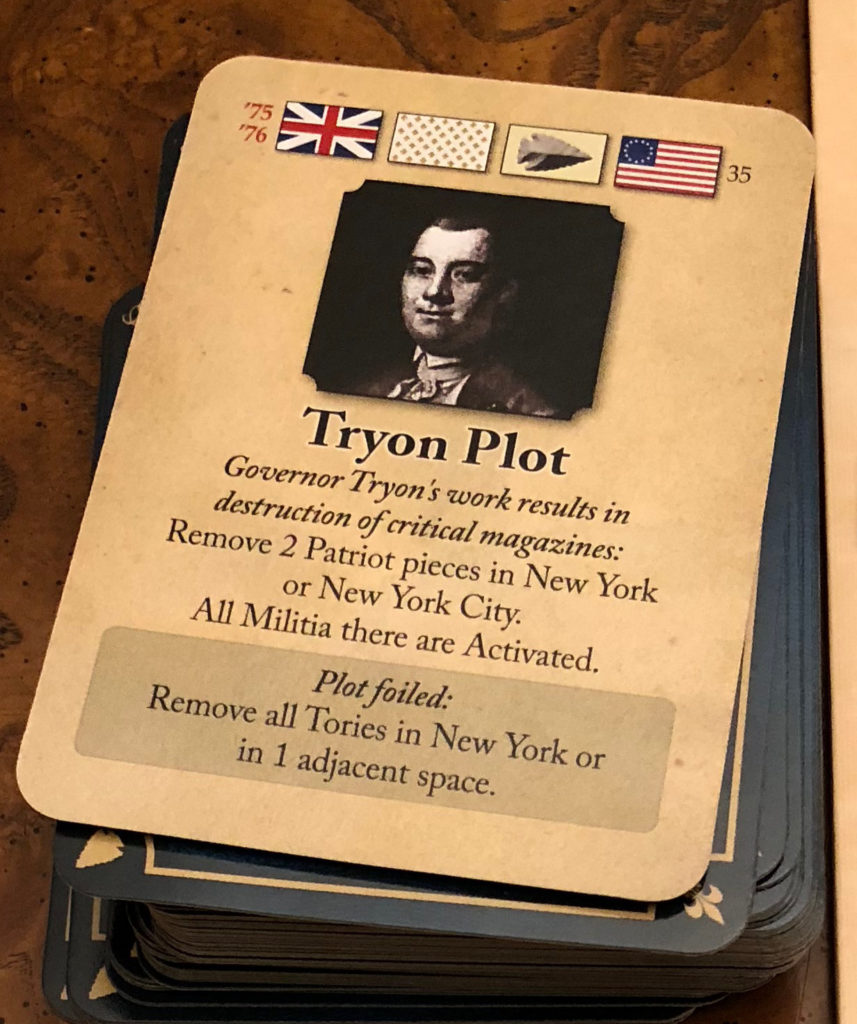

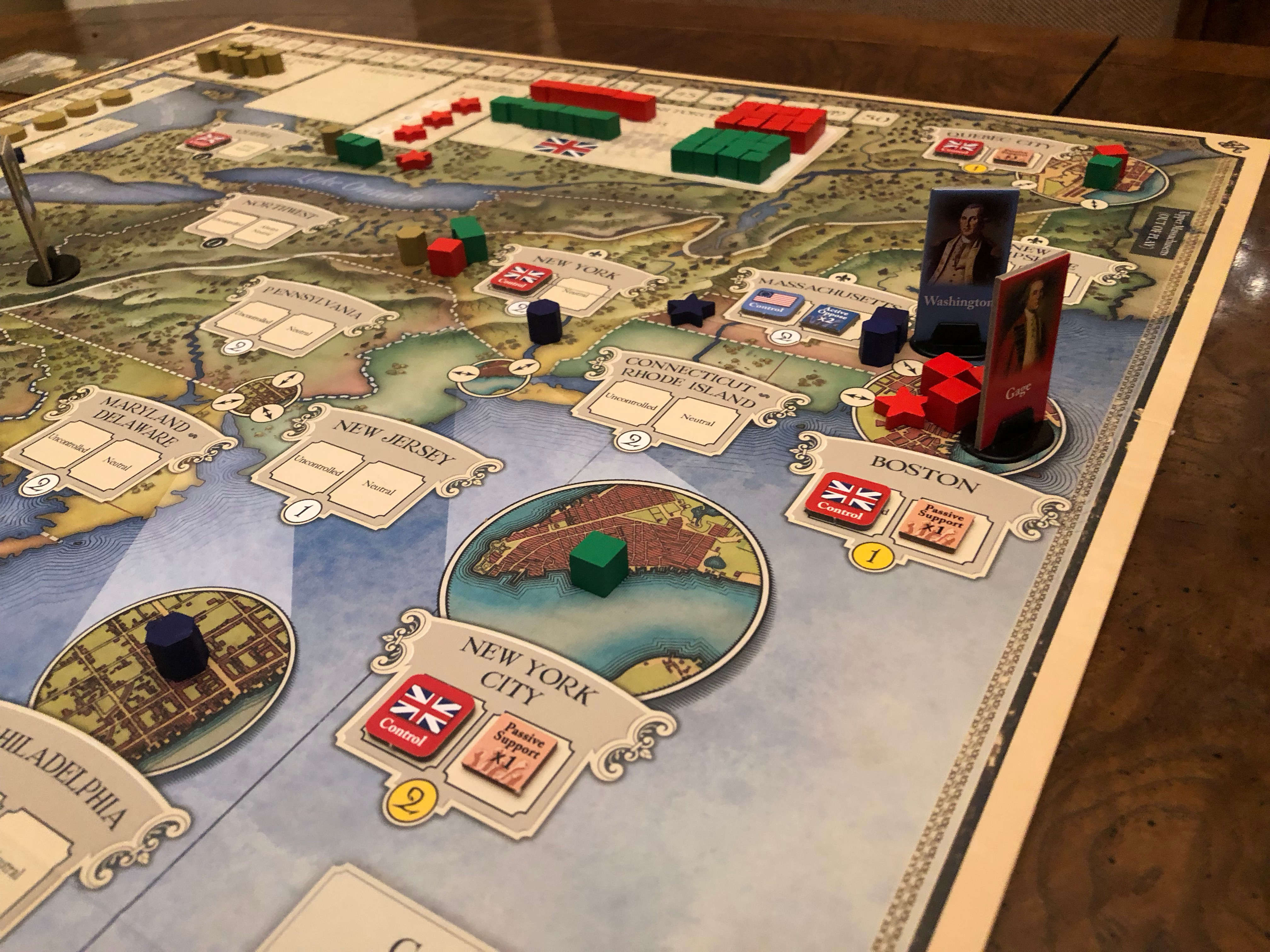

Really enjoying this series… I have A Distant Plain and Fire in the Lake, but have never tackled the bots. I played Labyrinth several times solo and that was enough of a brain burner - I can’t imagine playing against three flowcharts!
Can I just say how weird it is to be a modern Brit and have to deal with the Tory terminology? It’s always just a little nudge that makes me go “What?” When playing as the Brits I’m sat there, ruminating “Why am I so reluctant to place these little green cubes…”
One of the things I admire most about LoD is you can let other factions have their head and put themselves out of the race by fighting. In one of my games, the Brits got several powerful events (including Hessians, above) and were quickly at maximum power. There followed several titanic battles between Brits and Patriots, which the Brits won, yet they took considerable casualties each time. The Patriots had little trouble rebounding from the defeats, the British could not get over their victories.